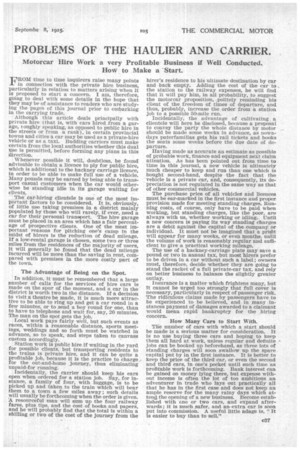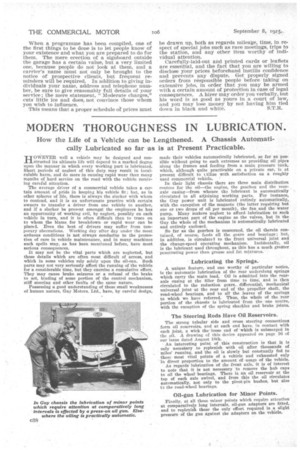PROBLEMS OF THE HAULIER AND CARRIER.
Page 21

Page 22

If you've noticed an error in this article please click here to report it so we can fix it.
Motorcar Hire Work a very Profitable Business if Well Conducted. How to Make a Start.
FROM time to time inquirers raise many points in connection with the private hire business, particularly in relation to matters arising when it is proposed to start a concern. I am, therefore, going to deal with some details in the hope that they may be of assistance to readers who are studying the pages of this journal prior to embarking in the carrying trade.
Although this article deals principally with private hire (that is, with cars hired from a garage, roughly speaking, as opposed to public hire in the streets or from a rank), in certain provincial towns and cities a car may be used as a private-hire vehicle or as a taxi. Budding carriers must make certain from the local authorities whether this dual use is permitted, before forming any plans in this direction.
Whenever possible it will, doubtless, be found advisable to obtain a licence to ply for public hire, which is additional to the hackney carriage licence, in order to be able to make full use of a vehicle. Many pounds may be earned by being able to transport casual customers when the car would otherwise be standing idle in its garage waiting for clients.
I. The car-hiring clientele is one of the most important factors to be considered. It is, obviously, of little use taking premises in a district mainly populated by those who will rarely, if ever, need a ear for their personal transport. The hire garage must be placed in an area which has a fair percentage of prospective clients. One of the most important reasons for pitching one's camp in the midst of hirers is the reduction of dead mileage. If a low-rental garage is chosen, some two or three miles from the residences of the majority of users, it will generally be found that the dead mileage incurred will be more than the saving in rent, compared with premises in the more costly part of the town.
The Advantage of Being on the Spot.
In addition, it must be remembered that a large number of calls for the services of hire cars is made on the spur of the moment, and a car in the district is worth two in the distance. If a decision to visit a theatre be made, it is much more attractive to be able to ring up and get a car round in a few minutes, or to ,send a boy round for one, than to have to telephone and wait for, say, 20 minutes. The man on the spot gets the job. Local work pays fairly well, but such events as races, within a reasonable distance, sports meetings, weddings and so forth must be watched in advance, so to speak, and steps taken to canvass custom accordingly. Station work is public hire if waiting in the yard for possible clients, but transporting residents to the trains is private hire, and it can be quite a profitable job, because it is the practice to charge for the out-and-home journey, thus eliminating unpaid-for running.
Incidentally, the carrier should keep his ears open when ordered for a station job. Say, for instance, a family of four, with luggage, is to be picked up and taken to the train which will bear them to a town a few miles away ; such details will usually be forthcoming when the order is given. A resourceful man will sum up the four railway fares, plus tips, and the cost of books and papers, and he will probably find that the total is within a shilling or two of the cost of the journey from the hirer's residence to his ultimate destination by car and back empty. Adding the cost of the car to the station to the railway expenses, he will find that it will pay him, in all probability, to suggest the motorcar proposition' politely reminding his client of the freedom of times of departure, and thus, probably, increase the order from a station job to a possible 50-mile run. Incidentally, the advantage of cultivating a clientele will here be disclosed, because a proposal to convey the party the whole distance by motor should be made some weeks in advance, as nowadays paterfamilias gets his rail tickets and books the seats some weeks before the clue date of departure.
Having made as accurate an estimate as possible of probable work, finance and equipment next claim attention. As has been pointed out from time to time in this journal, a new vehicle is ultimately much cheaper to keep and run than one which is bought second-hand, despite the fact that the vehicle is a private car, and, consequently, its depreciation is not regulated in the same way as that of other commercial vehicles.
The purchase price of all vehicles and licences must be ear-marked in the first instance and proper provision made for meeting standing charges. Running costs, of course, only have to be paid When working, but standing charges, like the poor, are always with us, whether working or idling. Until a new concern is paying its way standing charges are a debit against the capital of the company or Individual. It must not be imagined that a profit will appear for many weeks, or even months, until the volume of work is reasonably regular and sufficient to give a practical working mileage.
The use of a hackney-carriage plate may save a pound or two in annual tax, but most hirers prefer to be driven in a car without such a label ; owners must, therefore, decide whether they are going to stand the racket of a full private-car tax, and rely on better business to balance the slightly greater outlay. Insurance is a matter which frightens many, but It cannot be urged too strongly that full cover is necessary, particularly in respect of passenger risk. The ridiculous claims made by passengers have to be experienced to be believed, and in many Instances payment of damages awarded to a claimant would mean rapid bankruptcy for the hiring concern.
How Many Cars to Start With.
The number of cars with which a start should be made is a serious matter for consideration. It is no use buying three cars and hoping to keep them all hard at work, unless regular and definite jobs can be booked up beforehand, as three lots of standing charges will soon swallow up the spare ,capital put by in the first instance. It is better to , keep the price of the third car, or even the second and third cars, in one's pocket until such time as profitable work is forthcoming. Bank interest can be gained on money lying there, but expense without income is often the lot of too ambitious an adventurer in trade who lays out practically all that he has in the first case and does not keep an ample reserve for the many rainy days which attend the opening of a new business. Become established with cue or two cars, and expand afterwards ; it is much safer, and an-extra car is soon put into commission. A useful little adage is, .` It is easier to buy than to sell." When a programme has been compiled, one of the first things to be done is to let people know of your existence and what you are prepared to do for them. The mere erection of a signboard outside the garage has a certain value, but a very limited one, because people do not look at them, and a carrier's name must not only be brought to the notice of prospective clients, but frequent reminders will be required. In addition to giving individuals your name, address and telephone number, be sure to give reasonably full details of your service ; the mere statement, "Moderate charges," cuts little ice and does, not convince those whom you wish to influence.
This means that a proper schedule of prices must be drawn up, both as regards mileage, time, in respect of special jobs such as race meetings, trips to the station, and any other iteni worthy of individual attention.
Carefklly-laid-out and printed cards or leaflets are essential, and the fact that you are willing to disclose your prices beforehand instills confidence and prevents any dispute. Get properly signed orders from responsible people before taking on extensive jobs, in order that you may be armed with a certain amount of protection in case of legal consequences, A hirer may order you verbally, but his word is as good as yours in a court of law, and you may lose money by not having him tied down in black and white: S.T.R.






























